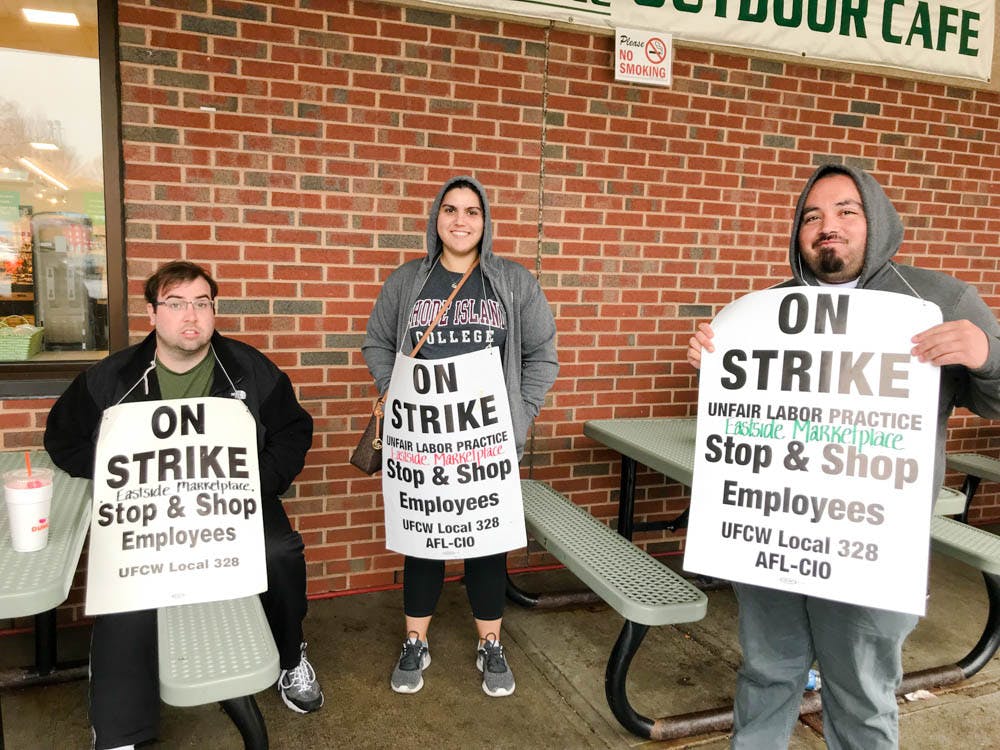Stop & Shop and 31,000 of its New England employees entered a tentative contract agreement Sunday night after ten days of picketing with community support but without pay.
Picketers, including those from College Hill’s Eastside Marketplace, are expected to return to work Monday.
The new, three-year agreement will include increased pay for all associates and continued health coverage and pension benefits, according to a Stop & Shop statement.
A statement from the five local United Food and Commercial Workers unions that represent New England’s striking workers called the strike and subsequent deal a “powerful victory.”
The strike, which began April 11, started after union employees were dissatisfied with proposals made by the company during contract negotiations that would have changed wages, pensions and health care. With workers on strike, some locations like Eastside, which is owned by Stop & Shop, closed, while others remained open with smaller staffs and fewer customers.
The proposed changes included an income increase of less than two percent for some part-time workers, increased health care expenditures and cuts to new employees’ pensions, according to a statement from the local UFCW unions. The new deal promises to preserve healthcare and retirement benefits and provide wage increases, but neither statement specified by how much.
In response to criticism of the proposal, Stop & Shop had released multiple statements, one of which stated that “Stop & Shop’s proposed wage package would be among the best UFCW retail contracts in the country.”
The company also released a “myth” versus “fact” sheet that outlines supposed misconceptions about the deal that have been circulating in the community.
“Stop & Shop would pay at least 92 percent of premiums for family coverage and at least 88 percent for individual coverage,” the sheet says, highlighting that this is much higher than the 72 percent of family premiums and 80 percent of individual premiums other retailers pay on average.
Workers who spoke with The Herald said the previously proposed contract changes would have increased out-of-pocket healthcare spending and failed to raise wages enough to keep pace with inflation rates.
“We want what’s owed to us,” said Valerie Giblin, an Eastside employee and UFCW Local 328 union executive member who has worked for Stop & Shop for 23 years, and before the strike “never had a problem” with the company. Giblin stood with over a dozen other employees outside Eastside Saturday to show frustration over what they view as less-than-fair contract changes. As workers held up signs Saturday morning, people passing in cars honked and waved in support, while other community members brought over food for the picketers.
In the statement from the local UFCW unions announcing the agreement, the workers thanked the community for their support: “We are incredibly grateful to our customers and everyone who proudly stood together with us every day.”
Community leaders also stepped into the conversation. Mayor Jorge Elorza expressed his support for the picketers, and four 2020 presidential hopefuls, including former Vice President Joe Biden and Senator Elizabeth Warren, visited the picket line last week.
The International Brotherhood of Teamsters also backed their fellow union workers, and would not deliver fresh foods to Stop & Shop locations that remained open.
Some University groups supported the strike, including the Brown College Democrats and the Brown Student Labor Alliance.
The Brown Dems and SLA, among other groups, organized trips to the picket line at the River Street Stop & Shop, which remained open.
Rose Lang-Maso ’20, president of the Brown Dems and Rhode Island resident, took a group of students there last week.
“We got a lot of cars to turn around,” Lang-Maso said, adding that she saw an “immediate impact” happen as customers chose not to shop after speaking with strikers.
The picketing appeared effective, as regular customers decreased their visits to the store by 75 percent, the Boston Globe reported.
SLA member Hal Triedman ’20.5 also went to the picket line and said that groups worked to raise awareness of the strike and urged students to shop elsewhere.
Without pay, some strikers were struggling. Dot Mandeville has worked for the grocery store chain for five years. “It was in the wind,” Mandeville said of the strike, and so she put a little money away before it started. She was unsure how those who live paycheck to paycheck were managing.
Before the tentative agreement was struck and while the strike was ongoing, Stop & Shop donated to food pantries and children’s hospitals, as stores remained full of food and empty of customers.
With a deal in the works, “associates’ top priority will be restocking our stores so we can return to taking care of our customers and communities,” according to Stop & Shop’s statement.





